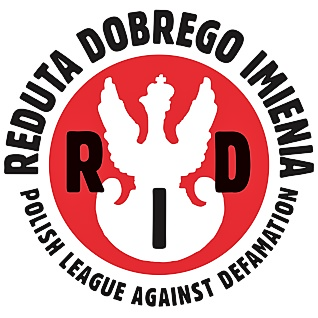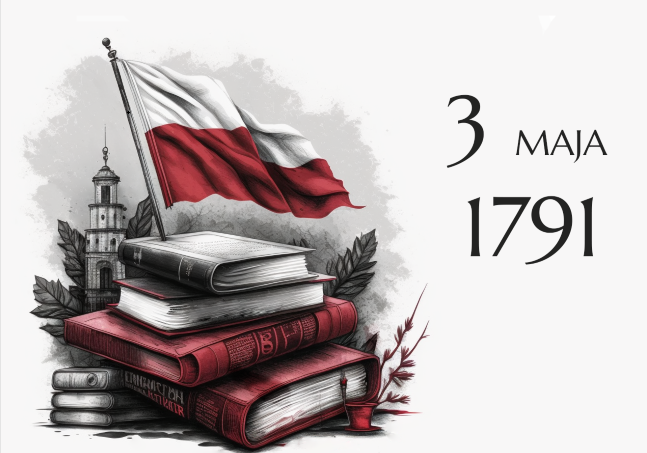May 2, 2023 | News
The second Constitution in the world and the first in Europe is an undoubted achievement of Polish political thought. However, we must also remember that the adoption of the May 3 Constitution should be treated as a warning. A warning against proceeding too late with reforms and actions.
In favor of the Constitution were practically all the lands truncated by the First Partition of the Republic, but it was not a majority of the members of the Sejm.
The aide urged support for the Constitution with the words:
„In a sincere desire to save the homeland, in circumstances terrible for the Republic, the project under the title of the Act of the Government in the hand of the august Marshal of the Sejm and the Crown Confederation submitted for the most valiant support we accept, pledging our undertaking with the slogan of love of the homeland and the word of honor, which for greater faith we state with our signatures.”
The document, promulgated on May 2, was signed by 83 deputies and senators.
The Constitution was signed by 14 people as representatives of the Lands of the Republic.
Of the 182 members of parliament present at the Castle, 72 voted against the Constitution on May 3.
Stanislaw Augustus did not rise to the occasion as a monarch, as Karol Zbyszewski, one of the best pens of the Second Republic, wrote in his would-be doctoral dissertation „Nemtsevich from Front and Back.”
„There is only the question: can any merits in the cultural field offset the crime of allowing partition? I exclaim: Stanislaw Augustus did not take the side of the Barzanians, but signed the l-th partition; he did not fight in the 92nd, but joined the Targowica; he was in Catherine’s pay; for money he was ready to abdicate, sign whatever he was ordered to sign; he considered Kosciuszko a madman, and the insurrection a crime… To this they answer me: yes, but he founded the School of Knights, supported painters, invited literary men to dinner, built the Baths… It’s like a murderer of parents being defended by a lawyer with the argument that he threw a forget-me-not on their corpses! „
The Republic lost the Polish-Russian war, lost the Kosciuszko Insurrection and entered the period of partitions for 123 years.
The partitions still cast a shadow on our history today, and it’s not just about the obvious social differences on the map of today’s Poland, cut through like a knife by the former partition borders, it’s also about our position in the world. In the era of the first wave of globalization, the formation of modern political concepts, ideological currents, Poland was not on the map. Countries building a modern political-national identity in Europe and the world in the 19th century were building it in a world without the Republic, which carries a consequence in their geopolitical and historical thinking.
The nineteenth century was also a time of the creation of history as a science, the emergence of historiography and the coming to the forefront of Anglo-Saxon science with a special emphasis on American science. A country that was born at a time when Poland was being slaughtered by its neighbours1.
Today is the 232nd anniversary of the introduction of the Constitution, the 228th anniversary of the loss of independence and the 105th anniversary of its restoration. We are still 18 years short of being able to say that independent Poland has functioned on the maps of the world the length of time it disappeared from them. Although, as we know, we cannot consider this entire period as the functioning of an independent Poland due to World War II and its aftermath. Thanks to the above „enumeration”, however, it is easier to understand how difficult it is to change mental habits in the world, how different our world is from the world of our great-grandparents who regained independence. Just as it is natural for us today that Austria-Hungary does not exist, so unfortunately for parts of the West it is natural that Poland did not exist.
It is the task of the Polish League Against Defamation, our task, to remind the world of the merits of the Republic, and to defend our history against the faults wrongly attributed to us.
Today’s world gives us a wonderful opportunity to do so, the behavior of Polish society towards refugees from Ukraine is an example that appeals to the Western world. This behavior also fits in with the provisions of the May 3 Constitution:
„we proclaim complete freedom for all people, both newcomers and those who, having first left the country, would now like to return to their homeland, to the extent that every person to the countries of the Republic newly arrived from either side or returning, as soon as he sets foot on Polish soil, shall be free to use his own industry as and where he pleases, shall be free to make contracts for property, labor or rents as and as long as he pleases, shall be free to settle in the city or in the countryside, shall be free to live in Poland or to the country to which he wishes to return, having fulfilled the obligations which he voluntarily assumed. „
Poland is making a huge effort to strengthen its own armed forces, the desire to strengthen the army was also expressed emphatically in the May 3 Constitution:
„The army is nothing else, but a drawn defensive and decent force from the general strength of the nation. The nation owes its army super-gratitude and reverence for sacrificing itself solely for its defense. The military owes the nation to guard its borders and general tranquility, in a word, it should be its strongest shield.”
The changing international position of our homeland, the strengthening of our place in the world by the actions of the supreme power and the responsible behavior of society in times of crisis intensify, as they once did, the desires of centers hostile to us to harm Poland. History teaches and sensitizes us – in 1791 we also realized the necessity of defending Poland from outside influences:
„suffered the calamities of interregnum, periodically subverting the government, the duty to insure the fate of every inhabitant of the land of Poland and closing forever the path of influence of foreign powers” – which resulted in the decision to establish a hereditary monarchy and abandon elections.
Awareness of internal threats and the desire to prevent them was also expressed in a constitutional provision:
„Everything and everywhere should be decided by a majority vote; therefore, liberum veto, confederations of all kinds and confederate assemblies, as contrary to the spirit of this constitution, overthrowing the government, destroying the community, we forever abolish.”
Ladies and Gentlemen,
The May 3 Constitution, in many passages, remains a living document and a lesson for us to remember the consequences of being too slow to respond to apparent threats, as well as a testament whose fulfillment we owe to our heritage – a memory deserving of the bronze monument that the great work of the Polish-Lithuanian Commonwealth – a refuge of freedom and republicanism in Europe – put up by our ancestors remains.
Vivat 3 May!
[1] These shortcomings can be seen, for example, in the latest political science book by prominent American thinker Henry Kissinger, „World Order,” Czarne Publishing House, Warsaw 2017. The Commonwealth is practically absent from the pages of the publication despite its treatment of such events as the 1683 Siege of Vienna.

